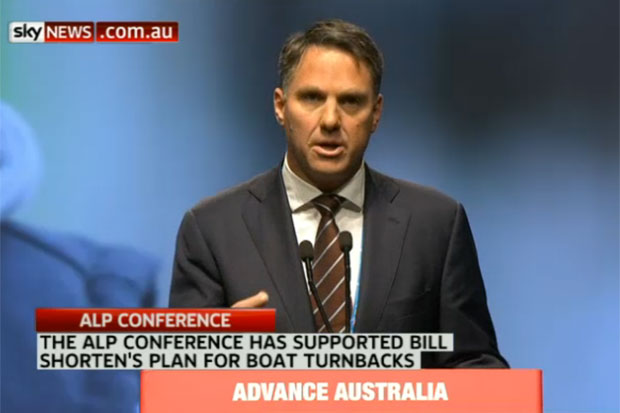It was a big weekend for the shadow minister for immigration.
As the ALP’s national conference finally arrived it must have provoked a few nerves for the man staking his career on a policy of turning refugees back to sea – ‘where it is safe to do so’.
In the lead up to the conference Richard Marles had been checking in with refugee groups, making the case for turn backs, and gathering feedback on other proposals, some of which were added to the party’s platform on Saturday. Labor has committed to upping Australia’s refugee intake over a 10-year period and agreed to appoint an advocate for children in detention, though their plans remain fuzzy, and refugee advocates have been cautious in their support.
When the crucial vote on turn backs came to the floor it went about as well as Marles could have hoped. The proposed amendment to the party’s platform – to make it explicitly anti turn back – went down, and party leaders got to congratulate each other on how civil the debate had been.
The day before, the shadow minister had addressed a packed room at one of the conference’s ‘fringe events’, where public policy and Labor aligned groups hosted forums across the weekend.
The session was tense, but Marles was prepared for most of the questions that came his way. The deaths at sea argument was deployed often, a talking point that has proved a gift for Labor right members trying to justify punitive policies to their own party.
Yet there was one question that finally caused Marles to come unstuck, forcing him to deviate from the pre-prepared lines he would eventually deliver to the party as a whole the next day, when the actual turn back debate took place.
What will happen to the 2,000 or so people already sent to Manus Island and Nauru? How much more will they have to endure in the name of stopping the boats, or deaths at sea, or political expedience?
The fate of these people was put to Marles by the Asylum Seeker Resource Centre’s Pamela Curr, who told the room that women are facing escalating threats in the community on Nauru. Curr opened by saying she did not wish to demonise Nauruans, but demanded to know what an ALP government would do to help refugees living on the island.

Suddenly we were no longer talking about hypothetical boats that could arrive under a potential future policy – these are real people facing enormous and ongoing difficulties right now, as a direct result of mandatory offshore processing and placement.
They are overwhelmingly being found to be refugees in need of protection, although their treatment would remain unjustifiable even if they were not. There is no sign those released from detention have any real prospects of long-term resettlement where they are now – in Nauru, or PNG, or Cambodia – and their futures remain entirely uncertain.
It was the first time Marles had to almost completely skirt a question. Despite having worked hard to convince the country he is genuinely worried about the health and safety of people seeking asylum, the shadow minister was at a loss to explain what he would be doing to improve the situation of those who have survived the journey by sea, only to be sent back across it to be held in limbo.
Marles eventually argued Labor would be more successful than the Coalition at negotiating with Pacific neighbours to resettle the refugees, but it wasn’t clear why. He said he did not think those stranded on either of the islands could be brought back to Australia.
With Australia’s discourse on asylum seekers obsessively focused on boats, it has been easy for the Coalition to get away with claiming policy victory despite the fact their approach has left 2,000 people trapped in places that have, at times, proved extremely dangerous.
You get the impression the government’s desire not to talk about these people has little to do with humanitarian concerns – talking up brutality has been an asset for them when it comes to refugee policy – and more to do with the fact they actually have no idea what to do about these men, women, and children.
For now, it seems, neither does Richard Marles or Labor.
In the meantime the horror stories and tales of everyday defeat coming off of the two islands only make life easier for Labor, the Coalition, and those who have decided deterrence is the right approach to refugees.
The point of these camps was always to make an example of the people sent there. Marles must be of the mind that not enough of an example has yet been made.
New Matilda contacted Marles’ office this morning to give the shadow minister the chance to outline what, if anything, his government would do to assist refugees living on Manus Island and Nauru. While responding to a separate inquiry, the office was yet to reply to questions about Nauru and Manus at the time of writing.
Donate To New Matilda
New Matilda is a small, independent media outlet. We survive through reader contributions, and never losing a lawsuit. If you got something from this article, giving something back helps us to continue speaking truth to power. Every little bit counts.



